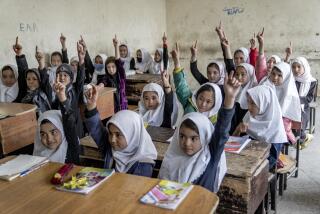5 Afghan Women Get Keys to Future at Cal State Northridge
- Share via
Typing has been a stumbling block for the visitors--five women who hold government jobs in their native Afghanistan.
They are spending two weeks at Cal State Northridge to improve their computer and English-language skills and to learn how to write grant proposals to get international aid for their country.
Two days into the extended-learning program, which began Monday, all five can send e-mail, with attachments. But the standard QWERTY computer keyboard has been challenging, perhaps because their native Dari, related to Farsi, is written right to left. So teachers at Cal State Northridge are putting together a quickie typing course for the women.
“They’re very, very eager,” said Matthew Clements, who is teaching them how to identify sources for grants and how to write and pitch grant proposals. “They’re very committed and very determined.”
Well-educated women between ages 22 and 36, they radiate the pent-up ambition--for their country and especially its women--that built during five years of Taliban rule. It has been less than a year since the Taliban were defeated and Afghan women could shed their burkas.
Until then, these women watched with dismay as Afghan girls were denied schooling, except on the sly, as well as access to medical care and even ice cream.
“People are very hopeful for the future,” said Marzia Basel, who was a judge before the Taliban came to power in 1996.
Several women in the program, sponsored by the State Department, sought refuge in Pakistan, but Basel stayed in the capital city of Kabul.
Unable to work as a judge, she taught English to boys ages 7 to 12. She also secretly taught girls and women, some in their 50s, exposing them to such Western writers as Shakespeare, Bertrand Russell and Victor Hugo. She avoided arrest by frequently moving her clandestine classroom.
The group is staying in Woodland Hills with their State Department translator. They have visited a local supermarket, sampled American fast food and shaken hands with numerous politicians. The Cal State Northridge campus has 32,500 students, more than twice as many as the University of Kabul, the only functional Afghan university, they said.
When the women met President Bush recently, most wore head scarves as strict Muslim women usually do.
After a few days on campus, most had abandoned their scarves, and the youngest, Welda Roostai, 22, was wearing bell bottoms and fur wrist cuffs. Roostai, who works for the Ministry of Women’s Affairs, has been e-mailing for years and hopes to become a pharmacist.
Even when life in Afghanistan was bleakest, the women managed to stay in touch with the rest of the world. Breshna Sadat, a lawyer who works in the Ministry of Foreign Affairs, hid a satellite dish on her balcony during the Taliban regime.
All English speakers, the women said many Western performers and cultural figures are well known in Afghanistan, including Michael Jackson, Jacqueline Kennedy and Madonna.
In different ways, each of the women said that education changes people’s lives. Simin Bahmanyar, an administrator in Cal State Northridge’s College of Extended Learning who helped set up their campus program, said that in her native Iran there is an adage: “Educate a man and you’ve educated one person. Educate a woman and you’ve educated a whole family.”
In class, Clements said, the women talk about the high mortality rate for Afghan infants, the lack of decent health facilities and the dearth of schools. But instead of dwelling on the past, they seem determined to bring about change.
Journalist Masooda Barekzaie said there is a new women’s magazine in Afghanistan called The Future.
Married with three children, Jina Haidari works in the Ministry of Women’s Affairs. Her children were educated in Peshawar, Pakistan, with considerable input from their mother.
“My daughter is 9, and she’s in seventh grade,” Haidari said, with obvious pride.
The women tick off a list of things Afghanistan needs--physical security for its people (there are still armed men on the streets of Kabul, they said); medical care, especially for women; safe, affordable housing; and, above all, education.
“When people take up the pen, they put down the gun,” Basel said.
More to Read
Sign up for Essential California
The most important California stories and recommendations in your inbox every morning.
You may occasionally receive promotional content from the Los Angeles Times.













